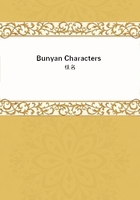
第235章 MR. WET-EYES(3)
gave you a specimen of one of Mr. Wet-eyes' prayers in the introduction to this discourse, and you did not discover much the matter with it, did you? You did not discover much filthiness in the bottom of that prayer, did you? I am sure you did not. Ah!
but that is because you have not yet got Mr. Wet-eyes' eyes. When you get his eyes; when you turn and employ upon yourselves and upon your tears and upon your prayers his always-wet eyes,--then you will begin to understand and love and take sides with this inconsolable soul, and will choose his society rather than that of any other man--as often, at any rate, as you go out to the Prince's pavilion door.
5. 'Mr. Repentance was my father, but good men sometimes have bad children, and the most sincere do sometimes beget great hypocrites.
But, I pray Thee, take not offence at the unqualifiedness of Thy servant.' Take good note of that uncommon expression, 'unqualifiedness,' in Mr. Wet-eyes' confession, all of you who are attending to what is being said. Lay 'unqualifiedness' to heart.
Learn how to qualify yourselves before you begin to pray. In his fine comment on the 137th Psalm, Matthew Henry discourses delightfully on what he calls 'deliberate tears.' Look up that raciest of commentators, and see what he there says about the deliberate tears of the captives in Babylon. It was the lack of sufficient deliberation in his tears that condemned and alarmed Mr.
Wet-eyes that day. He felt now that he had not deliberated and qualified himself properly before coming to the Prince's pavilion.
Do not take up your time or your thoughts with mere curiosities, either in your Bible or in any other good book, says A Kempis.
Read such things rather as may yield compunction to your heart.
And again, give thyself to compunction, and thou shalt gain much devotion thereby. Mr. Wet-eyes, good and true soul, was afraid that he had not qualified himself enough by compunctious reading and self-recollection. The sincere, he sobbed out, do often beget hypocrites! 'Our hearts are so deceitful in the matter of repentance,' says Jeremy Taylor, 'that the masters of the spiritual life are fain to invent suppletory arts and stratagems to secure the duty.' Take not offence at the lack of all such suppletory arts and stratagems in thy servant, said poor Wet-eyes. All which would mean in the most of us: Take not offence at my rawness and ignorance in the spiritual life, and especially in the life of inward devotion. Do not count up against me the names and the numbers and the prices of my poems, and plays, and novels, and newspapers, and then the number of my devotional books. Compare not my outlay on my body and on this life with my outlay on my soul and on the life to come. Oh, take not mortal offence at the shameful and scandalous unqualifiedness of Thy miserable servant.
My father and my mother read the books of the soul, but they have left behind them a dry-eyed reprobate in me! Say that to-night as you look around on the grievous famine of the suppletory arts and stratagems of repentance and reformation in your heathenish bedroom.
Spiritual preaching; real face to face, inward, verifiable, experimental, spiritual preaching; preaching to a heart in the agony of its sanctification; preaching to men whose whole life is given over to making them a new heart--that kind of preaching is scarcely ever heard in our day. There is great intellectual ability in the pulpit of our day, great scholarship, great eloquence, and great earnestness, but spiritual preaching, preaching to the spirit--'wet-eyed' preaching--is a lost art. At the same time, if that living art is for the present overlaid and lost, the literature of a deeper spiritual day abides to us, and our spiritually-minded people are not confined to us, they are not dependent on us. Well, this is the Communion week with us yet once more. Will you not, then, make it the beginning of some of the suppletory arts and stratagems of the spiritual life with yourselves? I cannot preach as I would like on such subjects, but I can tell you who could, and who, though dead, yet speak by their immortal books. You have the wet-eyed psalms; but they are beyond the depth of most people. Their meaning seems to us on the surface, and we all read and sing them, but let us not therefore think that we understand them. I cannot compel you to read the books, and to read little else but the books, that would in time, and by God's blessing, lead you into the depths of the psalms; but I can wash my hands so far in making their names so many household words among my people. The Way to Christ, the Imitation of Christ, the Theologia Germanica, Tauler's Sermons, the Mortification of Sin, and Indwelling Sin in Believers, the Saint's Rest, the Holy Living and Dying, the Privata Sacra, the Private Devotions, the Serious Call, the Christian Perfection, the Religious Affections, and such like. All that, and you still unqualified! All that, and your eyes still dry!